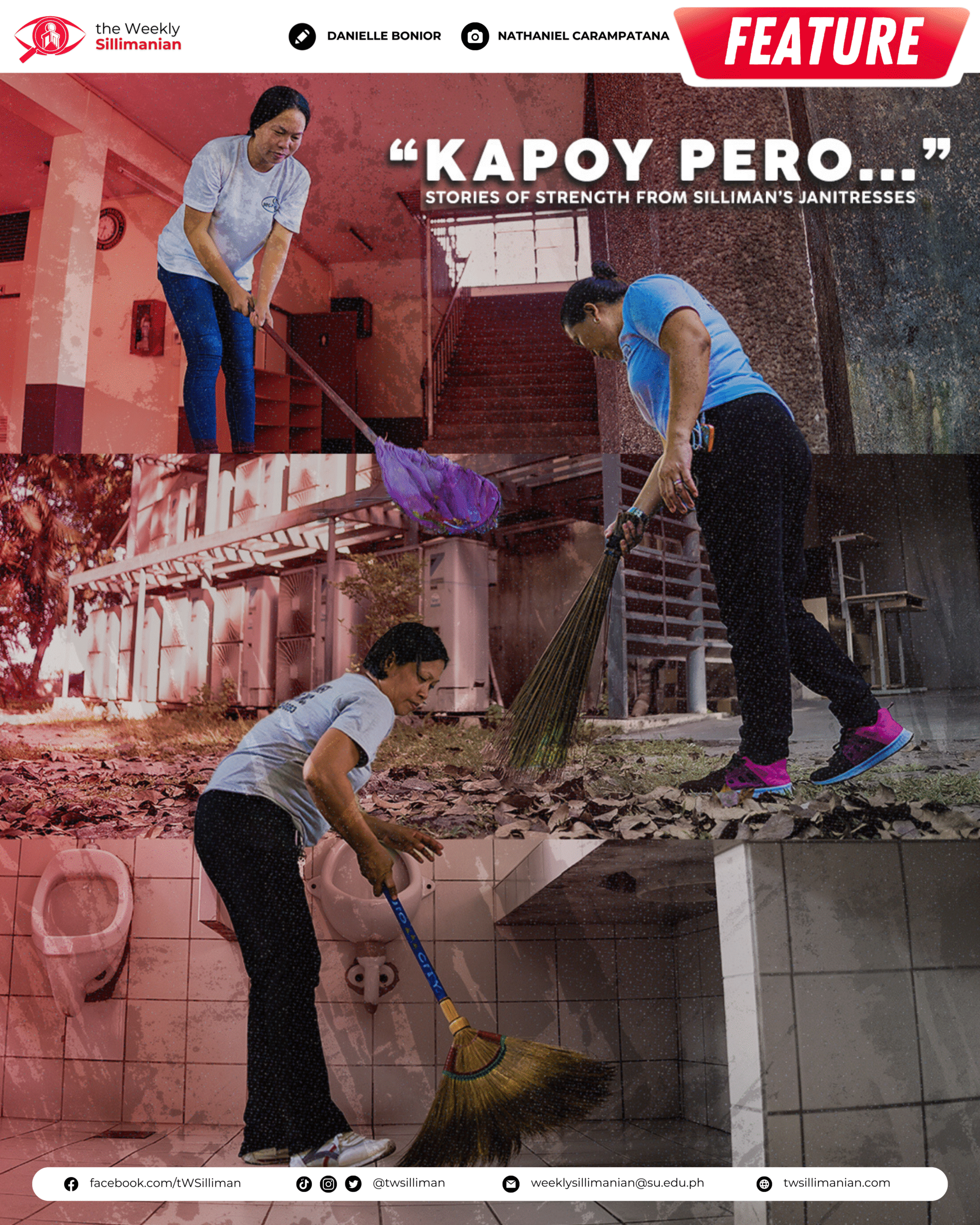By Danielle Bonior
Before the sun rises over the timeworn campus of Silliman University, the halls stir with quiet footsteps and the faint scent of soap and floor wax. While most of the students are still tucked away in bed or scrolling through their phones, someone has already scrubbed the restroom floors, wiped down the windows clouded by last night’s rain, and straightened every desk in our classrooms.
This is the beginning of Richel Villanoec’s day. As the janitress assigned to the College of Arts and Sciences, she starts her work quietly but deliberately, cleaning in spaces others often don’t notice. “Magsugod ko og trabaho, limpyo, hugas CR, limpyo-limpyo sa mga yuta (I start my work, cleaning, washing the restroom, cleaning the grounds),” she says, describing her routine simply. It’s the way she’s done it for years—without fanfare, without complaint.
Despite the physical strain of her work, Richel finds joy in the camaraderie with her fellow building and grounds (BG) staff. “Malingaw ko. Makalingaw man siya nga trabaho (I enjoy it. The work is actually fun),” she shares, smiling faintly as if she’s realizing it herself.
Beneath her words, too, lies a quiet resilience. For Richel, cleaning isn’t necessarily a career she’s chosen for herself—it’s a well-loved vehicle which plays into a larger purpose. “Para ni sa [mga] anak (This is for my children),” she says matter-of-factly.
Richel has four children, and she is deeply proud of how far they’ve come. “Naay duha ka anak nga naka-graduate [ug] naa pa’y duha nga mga college na (I have two children who have graduated and there are still two who will be in college),” she shares. She only has two left to account for now—her youngest daughter who’s still in school, and another daughter who has just entered university. It’s these children, these futures, that she holds close as she moves through her day.
When Richel’s day ends, it’s marked with a subtle sense of accomplishment that lingers with her. She moves through her tasks with the steady rhythm of someone who knows their work is meaningful, even if that meaning isn’t often seen.
As the day winds down for some, it only begins for Erlinda Baligsa. She clocks in at 6 p.m., part of the night shift that steps in when the campus begins to empty out.
To get the job, Erlinda went through the usual steps: “To become a janitress at Silliman University, one would need to apply for a position within Facilities Management,” she explains. The process involved submitting a resume and possibly attending an interview. Once hired, the responsibility was clear: clean and maintain the spaces that hundreds pass through each day.
What brings her the most pride is simple and direct: “Many people say I like this area clean.” The recognition of effort that matters—the small signs that someone noticed, even if they didn’t say much.
When challenges come her way, Erlinda doesn’t offer a dramatic anecdote. Instead, she points to something quiet but essential: “Developing skills, learning new things, and overcoming challenge[s].” There’s strength in this way of framing hardship—not as something that breaks, but as something that builds.
Not far from Richel and Erlinda’s world, Rachel Fabian starts her day with the same quiet precision. Arriving at 5:30 a.m., she logs in at BG and begins her own routine, moving through the same halls and classrooms, ensuring everything is set for the day ahead.
Rachel’s commitment, like Richel’s, is driven by love for her children. “Para sa future sa akong mga anak (For the future of my children),” she says softly, acknowledging the long hours and the exhaustion that comes with it.
Her eldest child studies at NORSU, and her youngest is just beginning her journey in RadTech. Despite the fatigue, there’s a quiet pride in knowing she’s giving her children a better chance at life.
And in the small moments—a smile from a student, a word of thanks from a professor—Rachel finds a bit of respite. “Kapoy gihapon (It’s still tiring),” she admits, but those small recognitions make all the difference, reminding her that her work is appreciated… and seen.
The hands of the university’s janitresses carry brooms and rags, and the toil and grime of deadlines, bills, unspoken worries, and the quiet dignity of showing up.
Richel, Erlinda, and Rachel pass through corridors most of us barely register, yet their presence shapes the rhythm of the campus day and night. They don’t ask to be noticed, but that doesn’t mean they shouldn’t be.
“Kapoy pero…” —tired, but still… Still working, still raising families, still cleaning the spaces we live and learn in. In every polished floor and spotless room, there’s a trace of their persistence. And that, too, is part of Silliman’s story.

